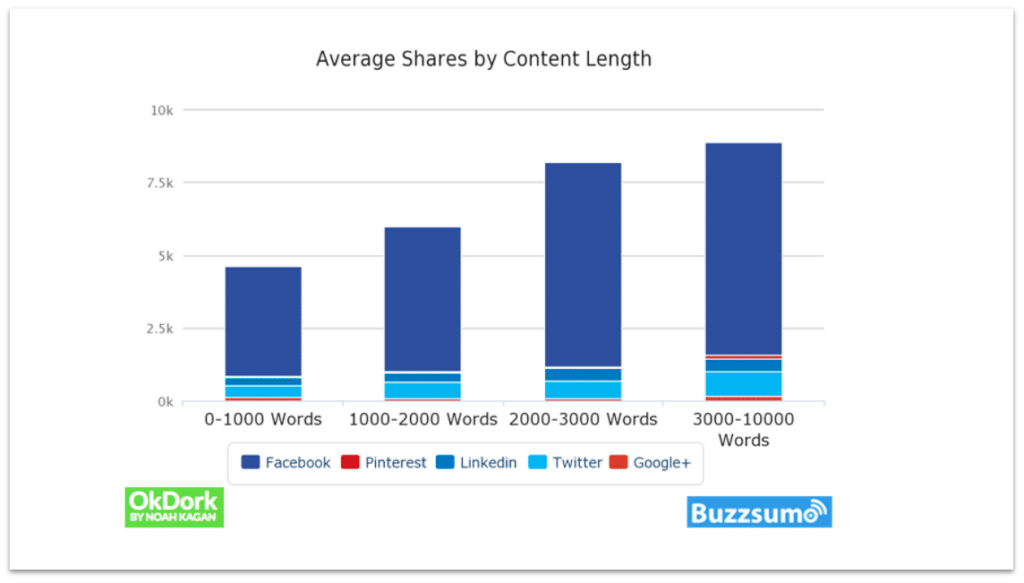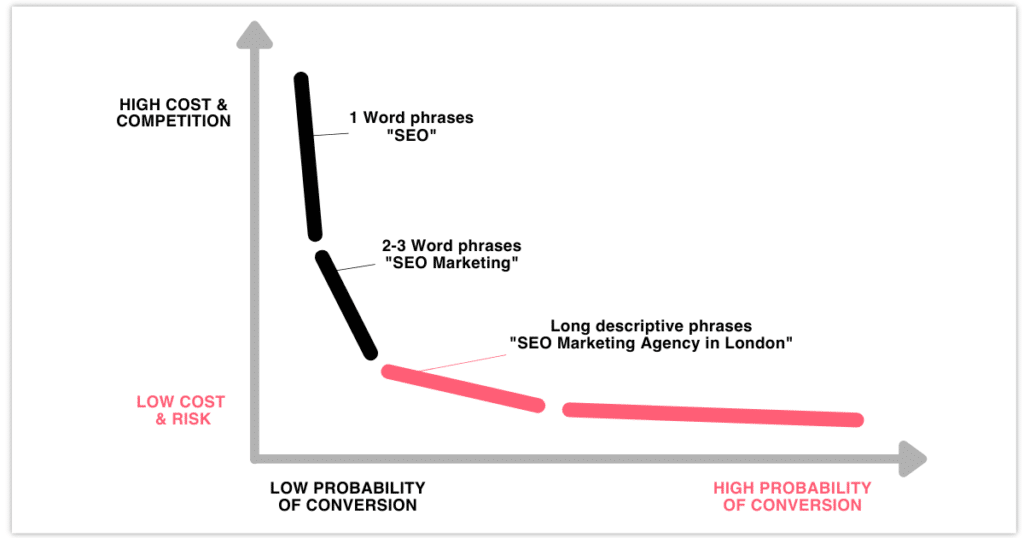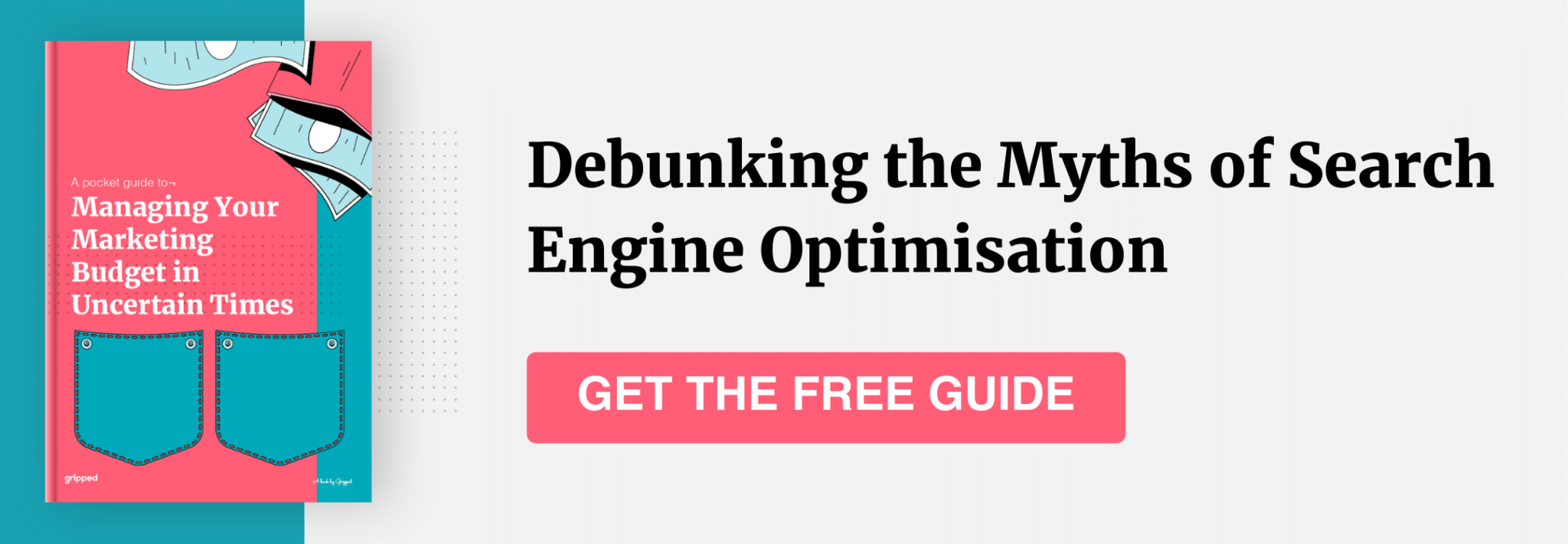Search Engine Optimisation (SEO) is constantly evolving and, as a marketer, it can sometimes be tricky to keep up. If you are on the lookout for some B2B SEO trends that are going to keep you ahead of the competition throughout the rest of the year, then look no further. Join us as we run through the six B2B SEO trends we think every marketer needs to know.
1. Long-form content is here to stay
Did you know that long-form content of 1,500 words gets 10% more shares than short-form content? As such, if you want your B2B marketing strategy to succeed in 2021, you’ll need to focus on long-form content.

Long-form content gives you the chance to provide value to your readers, achieve a higher ranking as a result, and build topical authority for your website.
Listed below are a few useful tips to help you write long-form content that your readers will love:
- Hook the reader with an engaging introduction.
- Add visuals and bullet points to break up long sections of text.
- Break your content into H2 and H3 subheadings so it’s easy to scan.
- Include relevant links to authoritative sites to back up your points.
2. Artificial intelligence is changing digital landscapes
Artificial intelligence (AI) is changing how people are interacting online. Tools like ‘RankBrain’ have a unique ability to learn, uncover information and articulate insights into users like never before. Thus, AI is an SEO trend you don’t want to miss out on in 2021.

But how do optimise your website for AI? While there is no hard and fast rule, user experience will play a major factor — including factors that range from click-through rates, to time spent on the page.
As a marketer, you can alter this by captivating your readers with content that is informative, engaging and well-presented.
Plus, with the help of AI, you will be able to create more impactful content, augment your keyword research, maximise your link building opportunities, and optimise your digital channels. Talk about a win-win.
3. Websites must be optimised for mobile
The mobile friendliness of your website can have a significant impact on your search rankings. Therefore, to ensure that your website is user-friendly, you need to optimise it for mobile.
Did you know, after all, that 96% of people use a smartphone to get things done?
With over 3.5 billion smartphone users around the world, that’s a huge amount of potential web traffic you could be bringing into your site!
Listed below are a few useful tips to help you get started:
- Keep web designs simple.
- Prioritise website speed.
- Make your website more responsive.
- Ensure pages are fast loading and optimised for mobile.
- Use Google’s Mobile-friendly testing tool for more help/advice.
4. Create high-quality content
As every B2B marketer will have heard, content is king – whether it’s in written form, video-audio format, infographic, or animation.
B2B marketing strategies focused on consistently creating high-quality, useful content, therefore, provide value for the reader. This helps you gain more traffic to your site, a more dedicated readership, and higher conversions.
As such, you need to avoid creating thin content where possible. Not only is it irrelevant, but it also doesn’t provide any value to the user and can be highly damaging to your SEO. Thin content can be defined by a number of things, but generally speaking, it can be categorised as content that adds little or no new and relevant value to a user.
SEO experts in the UK avoid damaging thin content. For example, thin content can lead to reduced backlinks — after all, if a gripping article title is followed by mundane and repetitive copy, that user likely will not return to your site, nor will they backlink it. Furthermore, repeated use of the ‘back’ button by users will inform search engines that your content is not of value and so organic traffic will diminish.
Here are a few tips to help you create the high-quality content your website deserves:
- Keep your content original – do not plagiarise!
- Keep your headlines strong, your facts accurate, and your points interesting.
- Regularly update your content to keep it relevant.
- Add bullet points and relevant images to make content easily digestible.
Want to improve your content marketing strategy?
Download this FREE Guide to find how to create the best lead generating content to accelerate your business growth.
5. Make the most of long tail keywords
Long tail keywords account for over 70% of all web searches. Yet, despite being one of the best ways to help you outrank the competition, they are woefully underused.
Not only do they add context to your content, but they can also support better conversion rates, and help you provide more value to your readers. Below are a few ways to utilise long tail keywords within your work:
- Focus on questions, specifically how-to questions.
- Optimise content for related keywords or questions.
- Use Google suggestions as a source for long tail keywords.
- Write content that provides a genuine solution for the reader.

6. Outreach To Trustworthy Sites
One of the most important aspects of content marketing is writing engaging, high-quality content that other people want to link to. And, as a result of this, inbound links still play a significant role in the success of your search engine rankings.
Authoritative sites will want to link to your content when you have something interesting to say (and you say it well). Therefore, by creating useful content that provides value, you will find that other sites will link to you more naturally, without you needing to go out of your way.
This is known as an effective link building strategy and it is one of the best ways to grow your website, brand visibility, and conversion success both in 2021 and beyond.
Final thoughts…
2021 is now officially getting back on track, but it’s not too late to incorporate these strategies into your B2B SEO marketing plan. Marketers must embrace progressive and intelligent technological practices like AI, as well as platform and search engine optimization. Similarly, it is crucial that marketers continue traditional best practices of content creation — that is, producing high-quality long-form content and using relevant keywords, long-tail or short.
These B2B SEO trends will ameliorate the overall marketing strategy of anyone or thing that employs them. But, particularly for B2B brands that are seeking to galvanise their online presence, taking SEO seriously is important. Building momentum in a digital-first economy requires bringing in outside expertise as well as developing in-house skills.
With a couple of tweaks here and there, a bit of extra hard work and the right level of motivation, we can pretty much guarantee you will find yourself on the road to success in no time.
Harvey graduated with a BAHons in Digital Marketing & Design and has over five years of experience working for a number of UK marketing agencies. Harvey is looking to inspire and connect with leading professionals. Follow Harvey on Twitter: @HarveyTweetsSEO

